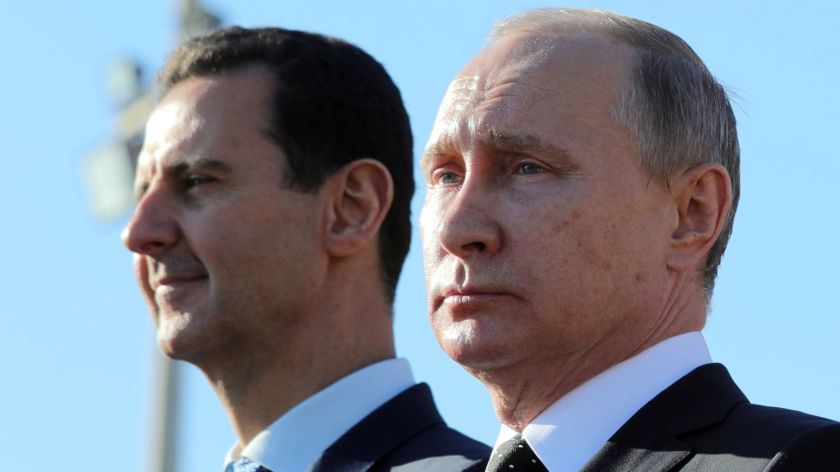
- ARAB NEWS
- 01 Jul 2025

The US sanctions against the Syrian government have tightened as the Caesar Act came into effect on Wednesday. Many Syrians have also been protesting as a result of the country’s deteriorating economy, devaluation of the currency, and the rising cost of basic commodities. Will the staunchest allies of the Syrian government, Iran and Russia, continue assisting the Alawite state despite the economic pressure they are facing themselves?
President Bashar Assad effectively owes his current position to Russia and the Iranian regime. If it were not for Tehran and Moscow’s financial, military, intelligence and advisory assistance in the wake of the Syrian uprising in March 2011, Assad would most likely have failed to maintain his grip on power. Financially speaking, the Islamic Republic has been one of the major bankrollers of the Syrian government. It spent about $6 billion a year during the first five years of the conflict in order to keep Assad, its staunchest regional ally, in power. Iran’s economic assistance to the Syrian government has come via a variety of methods, including oil subsidies, credit lines and military assistance. But, as Iran now faces severe economic pressures itself, its financial assistance to Syria has been reduced.
However, Iran has also deployed soldiers from the Islamic Revolutionary Guard Corps and its proxies, such as Hezbollah, to help the Syrian government score victories against opposition and rebel groups. Additionally, Russia provided military aid to Assad and, in 2015, intervened directly, mainly through missile strikes. The military assistance from Iran and Russia paid off, as Assad has been able to regain control of most of the territories he had once lost.
It is fair to argue that Iran and Russia are both facing significant challenges themselves because of the coronavirus disease pandemic and global economic slowdown, but they will most likely continue their strategic priority of helping Assad. Although Syria is not rich in natural resources, its location is of great significance. Russia’s strategic interests in the Mediterranean are intertwined with the political establishment in Damascus because the Syrian port of Tartus — its second largest — houses Russia’s only naval base in the region. In addition, Syria has been purchasing arms from Moscow for decades.
Although the Syrian government is secular, as opposed to the theocracy in Tehran, losing Syria would be detrimental for Iran on several levels. Since 1979, Syria has served as a platform from which the ruling mullahs have built formidable influence in the region. Iran’s alliance with Syria gave the theocratic establishment the opportunity to establish Hezbollah, the powerful movement in Lebanon, as well as to support the Palestinian Hamas movement. These proxy groups have allowed Iran to strengthen and preserve its regional influence, as well as appease the hard-liners domestically. If the Assad regime were to fall, Iran would lose not just the flexibility and capability that having a friendly Syrian government brings to these proxy groups, but also regional geopolitical leverage.
In other words, the potential collapse of the current political establishment in Damascus would adversely affect Iran’s logistical ties with its proxies in the Levant. Should Syria see a change in regime, it is unlikely that the new government would be supportive of Iran to the same extent as Assad. Undoubtedly, a democratic Syria with a Sunni majority (they constitute about 75 percent of the Syrian population) would be more sympathetic to the rest of the Arab world than it would Iran. More significantly, many Syrians and opposition groups have repeatedly condemned Iran’s human rights abuses in Syria. Assad’s fall would tremendously shift the regional balance of power against Iran and further isolate the Islamic Republic. This, together with its increasing international isolation and domestic pressure, would alter Iran’s regional role and could bring its regime close to the brink of collapse.
Exerting influence through Syria is critical for Iran and Russia because of their shared interest in counterbalancing the US.
Dr. Majid Rafizadeh
Russia’s leaders are also well aware of the disastrous political and strategic repercussions they would face as a result of Assad’s removal. Therefore, they are determined to prevent the current Syrian government’s downfall.
Finally, strategically speaking, exerting influence in the Middle East through Syria is critical for Iran and Russia because of their shared interest in counterbalancing the US and its allies in the region.
As the Syrian government faces more pressure economically, Iran and Russia will most likely do whatever they can to maintain Assad’s hold on power. Keeping him in office is a matter of national security and strategy for both Tehran and Moscow — they cannot afford to lose him.